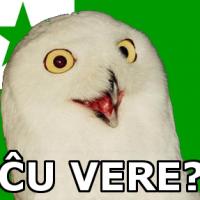Mesaĝoj: 12
Lingvo: English
Shanemk (Montri la profilon) 2010-oktobro-18 21:04:30
What is a good website that will drill me in what is an object in a sentence, and what is the subject. I can't go much farther in Esperanto until I can get it right in English.
Chainy (Montri la profilon) 2010-oktobro-18 21:14:18
Subject = Who? (who bought the book?) The clown did. The clown is the subject, the person or thing doing the thing.
Object = what? What did the clown buy? The book. The book is the object, telling us what was bought.
Ok, maybe a simple example, but it kind of sends you on the right track, I hope

mihxil (Montri la profilon) 2010-oktobro-18 21:59:22
Try replacing 'The clown' or 'the book' with 'he' in the example of Chainy, and you see what I mean.
duane (Montri la profilon) 2010-oktobro-18 22:44:52
mihxil:Try replacing 'The clown' or 'the book' with 'he' in the example of Chainy, and you see what I mean.That suggestion is great, and I'm sure I will use it often. I'm having the same problem as Shanemk.
erinja (Montri la profilon) 2010-oktobro-19 02:19:15
In grammar we have direct objects and indirect objects; in English, "him" indicates both direct object and indirect object.
In Esperanto, -n is only used with the direct object in most cases. We normally use a preposition to indicate an indirect object.
Direct object:
I [subject] saw him [object].
Indirect object [often set off with a preposition in English as well]:
I [subject] gave it [direct object] to him [indirect object].
ceigered (Montri la profilon) 2010-oktobro-19 03:39:50
An example:
Mi amas la domon.
Mi iras en la domo (al la cxambro).
Mi iras en la domon.
In order:
I love the house.
I go (whilst inside the house) to the room.
I go into the house, I enter the house.)
So don't overcompensate lest you be giving an entirely new meaning to your sentence.
 .
. AnFu (Montri la profilon) 2010-oktobro-19 04:56:49
Shanemk:...I'm left with a higher English vocabulary and very low recognition skills of what is the subject and what is the object in "more complicated" sentences.I'm in a similar situation as you. Grammar in school totally failed me. I only remember learning grammar for a semester in 9th grade and that was taught so horribly that I still remember my intense frustration. I learned grammar when I learned Spanish in college! Later, I taught myself more grammar. Esperanto is teaching me still more, especially about the more complicated sentences and less obvious situations.
What is a good website that will drill me in what is an object in a sentence, and what is the subject?
So, hopefully this will help. I love Wikipedia, http://en.wikipedia.org/wiki/Subject_(grammar). Note that the article has "odd"/"non-simple" types of subjects such as gerunds used as subjects, and infinitive forms of verbs used as subjects. There's a lot of grammar terminology in the article, but you can click on the terms to go to an article that may explain them.
Also check out Object in Wikipedia: http://en.wikipedia.org/wiki/Object_(grammar). Note again the section on "non-simple/weird" types of objects.
Here at Lernu there's this summary of "object" with examples: http://en.lernu.net/lernado/gramatiko/konciza/ob...
Check out Lernu's "Language Questions" When should I use the -n ending?
Also at Lernu, but in Esperanto, is a good summary of uses of the accusative, including objects: http://en.lernu.net/lernado/gramatiko/detala/aku...
Now this is my most important point. What helped me the most was a long summary similar to the one above (but much clearer and more extensive) of all the uses of the accusative -- including objects -- but instead of being in Esperanto, it is in English. It is in the book "Becoming Colloquial in Esperanto" by David Jordan, which is highly recommended by 'everyone' and is very useful. David Jordan's section on the accusative has helped me with the accusative more than anything else I've seen. I'm a MAJOR miser but I think it was well worth the money. You can buy it from Esperanto-USA read about it here and here or on Amazon.com read the reviews
I hope that helps.
sudanglo (Montri la profilon) 2010-oktobro-19 10:58:46
"English differentiates between the present and past time in the conditional, while Esperanto does not:
That is a long way from being true.
In very ordinary conversation in Esperanto you distinguish between Mi povintus tion fari = I could have done that and Mi povus tion far = I could do that.
Se Zamhof estus sciinta la Ĉinan, Esperanto estus ...
If Zamenhof had known Chinese, Esperanto would be ...
You can leave out flagging the past with the conditional in Esperanto IF it is quite clear from context.
Li ne devus esti dirinta kion li fakte diris.
erinja (Montri la profilon) 2010-oktobro-19 14:32:19
Miland (Montri la profilon) 2010-oktobro-19 16:27:10




